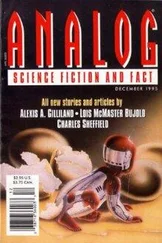“There’s too much interference!” said Christine, though little Bert was not being a bother at all, was nowhere near her. She sprang up and went back to the corridor, untied her scarf and let the wind lift her hair. The Norwegian stood close beside her and showed her his yoga method of breathing, pinching his nostrils and puffing like a bullfrog. The train stopped more and more erratically, sometimes every eight or nine minutes. Presently she noticed they were standing in a stationyard that seemed so hopeless, so unlikely to offer even the most primitive sort of buffet, that none of them made a move to go out. The yard buildings were saturated with heat, grey with drought, and the shrubs and trees beyond the station contained not a drop of moisture in their trunks and stems. A loudspeaker carried a man’s voice along the empty platform: “All the windows on the train are to be shut until further orders.”
“They can’t mean this train,” said the Norwegian.
Herbert, evidently annoyed by such a senseless direction, immediately went off to find the conductor. The woman in the corner began peeling an orange with her teeth. “I have diabetes, I am always hungry,” she said suddenly, apparently to little Bert.
Herbert soon came back with an answer: there had been grass and brush fires along the tracks. “They may even have been set deliberately,” he said. She could hear him explaining calmly to little Bert about the fires, so the child would not be alarmed.
“We can’t shut all the windows in this heat,” said Christine. “Certainly not for long.” No one answered her.
After the train had quit the grey stationyard she continued to stand at the open window, her hair flying like the little girls’ purple crêpe-paper streamers. Each time the train approached a curve she imagined the holocaust they might become. She thought of the ties consumed, flakes of fire on the compartment ceilings, sparks burned black on the first-class velvet. All the same, she kept hold of the two window handles, ready to slide the pane up at the first hint of danger. No one challenged her except for the bun-faced conductor, who asked if she had heard the order.
“Yes, but there aren’t any fires,” she said. “We need air.” It was true that there were no signs of trouble except for burned-out patches of grass. Not even a trace of ash remained on the sky, not even a cinder. The conductor continued to look at her in his jolly way, head to one side, a smile painted on his face, looking as round and as stuffed as a little clown. “All right,” she said. “I shall close the window, at least until Backnang. Then you can say that we all obeyed you.”
“The train has been rerouted because of the danger,” he said. “No Backnang.”
“That seems fairly high-handed of you,” she began, but of course she was wasting her breath. He was only a subaltern; he had no real power.
With its shut window, the compartment was unbearable now. Even little Bert was looking green.
“I was going to tell you about the change,” said Herbert. “But you were having a yoga lesson and I didn’t want to interrupt. We go through Coburg now. We shall be a couple of hours late, I imagine. I believe we change trains. Coburg is a pretty place,” he added, to console her.
“Will it be explained at the station at home?” she said. “Someone is supposed to be meeting me.”
“Meeting us,” Herbert corrected, because in the eyes of these strangers he and Christine were married. The truth was that they would separate at their home station as if they were strangers.
The woman in the corner emptied one of her plastic bags of all the food it contained and filled it with the rubbish. Sundays I had them for the two meals. They wanted just soup for supper, with cold ham and iceberg lettuce, dressing their way. The men ate Harvard beets in the factory canteen; they started wanting them. They wanted two or three different kinds of pizzas, mushroom ketchup, mustard pickles .
Little Bert kept an eye on Christine. “You never finished reading,” he said.
“I can’t remember what I was reading about,” she said.
“What is the book called?” he said.
“ All About Bruno ,” said Christine. “What else could it be?”
“No, that might confuse him,” said Herbert. “He knows Bruno is his own invention. The book is supposed to tell Christine how to think, little Bert. The Bruno story might be there. I don’t say it is.”
“Now who is confusing?” said Christine.
“But is the Bruno story inside?” said little Bert. “Look again,” he urged Christine.
She looked, or pretended to. “Bruno goes to the moon?”
“No, I know about the moon.”
“Bruno goes to an anti-authoritarian kindergarten?”
“Don’t tease him,” said Herbert.
“The kindergarten,” said little Bert. He leaned against her, out of fatigue, apparently. She might have felt pity for the fragile neck and the tired shadows around his eyes, but there were also the dirty knuckles, the bread-and-butter breath, the high insistent voice.
During the depression the factory laid off, nobody was buying the kitchen units. I went to collect the relief, he was too ashamed. They didn ’ t send you cheques in those days, you had to go round and see them. The other couple still came for dinner. We ate beans, sardines, peanut butter, macaroni. You could get lambs’ kidneys for twenty cents, nobody in the USA ate them. Also heart, tongue. He was laid off from February 16, 1931, to September 23, 1932. Went back part-time. I did part-time work cooking in Carol Ann ’ s school. She called me “Mrs.,” would never say I was a relative. My cousin-in-law never worked, always had headaches, had to lie down a lot, never learned English. Then the factory picked up full speed, getting ready for the conflict. I fed them all through the war, stood at the electric stove, making oxtail soup on the one hand, baked squash on the other, bread and milk when my cousin had his ulcer .
“I have something he might like to look at,” the woman in the corner said. She offered little Bert part of her collection of postcards, but he put both hands behind his back and pressed even closer to Christine. Taking no notice of him, the woman began handing the cards around clockwise, starting with Herbert. “My friends on their summer holidays,” she said. Herbert passed on the dog-eared coffee-stained views of Dubrovnik, Edinburgh, Abidjan, Pisa, Madrid, Sofia, Nice. “Very nice,” she said, encouraging Herbert. “Very nice people.”
The Norwegian looked at each card seriously, turned it over, examined the stamp, read the woman’s name and address, and tilted the card at an angle to read the message. The messages were aslant, consisted of a few words only, and ended in exclamation marks. He read aloud, “ ‘Very nice friendly people here!’ ”
The woman was smiling, handing the cards around, but her mind was elsewhere. We never took the citizenship so we never voted. Were never interested in voting. During more than forty years we would only have voted four times anyway. Would have voted:
In 1932 — for Repeal .
In 1936 — against government interference and wild spending. Against a Second Term .
In 1940 — against wild utterances and attempts to drag the USA into the conflict on the wrong side. The President of the USA at that time was a Dutch Jew, his father a diamond cutter from Rotterdam, stole the Russian Imperial jewels after the Bolshevik revolution, had to emigrate to avoid capture and prison sentence. Within ten years they were running the whole country. Had every important public figure tied up — Walter Winchell, everybody. Their real name was Roszenfeldt .
Читать дальше












